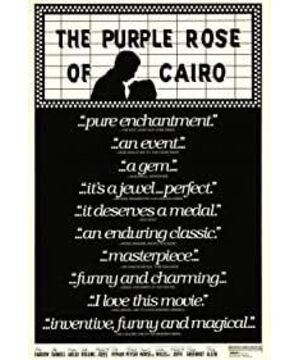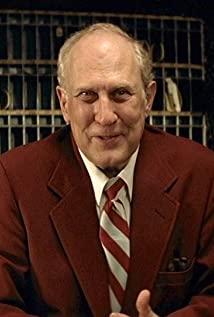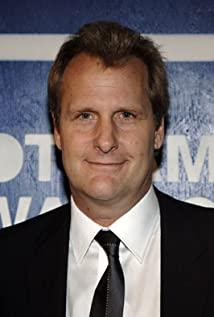From any angle, "Purple Rose of Cairo" can be regarded as an impeccable commercial film: the novel idea of the fictional character escaping the screen, the skilled expression of the classic narrative love triangle, the profound theme of virtual and reality and many more. In just over 80 minutes, Woody Allen did not waste a frame or a second. Every design and every line has a metaphor. If you ponder the words and deeds of the characters carefully, you can find that Woody Allen has described almost every aspect of the entire film industry. Although he doesn't give every character, every event in the film—they and they can correspond to the various "characters" and "accidents" in which the film industry operates in reality—the same pen and ink, some just downplay the location. Up to now, viewers need to make up their own minds, and some have been repeatedly emphasized to attract people's attention and deep thinking. "Purple Rose of Cairo" can still be regarded as a concise and condensed painting suitable for most countries. A map of the film industry.
This is the value of "Purple Rose of Cairo" visible from the horizontal level. On the vertical level, the thinking and inspiration it brings to people (filmmakers and ordinary audiences) will never be outdated. Woody Allen has made it clear that this film is about the question of fantasy and reality, and that the reason why the film—rather than books, radio, or other mediums—is used to explore this issue is for visual convenience. [1]
But I think there are two other reasons. The first is the characteristics of the film itself. As an emerging medium, film is in its prime. For the individual, the audio-visual language of the film has a "low threshold" but has a strong appeal; for the group, its dissemination is extremely fast and has a wide range of influence, which are far beyond the reach of books or broadcasts.
In addition, the social and cultural background is also a very important factor. "Purple Rose of Cairo", filmed in 1985, tells the story of a farce caused by a movie "Purple Rose of Cairo" in the 1930s. Since we want to discuss image and reality, dream and reality, the 1930s during the Great Depression, the golden age of movies (a typical representative of the illusory world) and the recessionary period of the real society, are undoubtedly the story. The best choice for background setting.
Looking further, in the 1980s, the American film industry was fully mature and far ahead of the world : it had experienced the contention of a hundred schools of thought (avant-garde, experimental film diversity, daring creative crazes faded, the classic Hollywood model began to The absolute advantage occupies the mainstream and completes the "unification", leaving a set of creative skills that are regarded as the standard. When the stereotype is rigid, the industry itself begins to "seek another way out". New Hollywood inherits and develops the former, completing another "rebirth". "), the perfection of various systems and codes (the maturity of the studio system has laid a certain foundation for the prosperity of genre films, the abolition of "Hays Code" has allowed the "mainstream" to "divide", and the development of the independent production model The era of multi-creation has opened again), as well as various political and social changes and turmoil (from passive escape and paralysis during the depression, to the enthusiastic advocacy and propaganda during the war, and then to the loss and confusion after the war. Before it really came, the Cold War, the Vietnam War... The "Beat Generation" began to be angry, rebelled, and began to reflect)... What should I do after becoming the "No. 1 in the world"? This is a question for the film industry and a question for American society. The lightly melancholy atmosphere that surrounds "The Purple Rose of Cairo"—it slowly tells a brutally realistic story with a playful comedy approach—is similar to the era of the 1980s, a post-turmoil An era of reflection, repair, and "return". Slow down and think, even as you prepare for an even more frenzied new century of "entertainment to death".
The author believes that the biggest creative gimmick of "Purple Rose of Cairo" (virtual characters into reality, real characters into the movie) is also its most profound and valuable philosophical metaphor. The media crisis of "entertainment to death" is, to some extent, caused by the dislocation of "playing into the play" and "indistinguishable from the play", as well as the tripartite predicament of the audience, actors and characters. of. The dislocation relationship of the three will be further discussed below.
A confused audience
Cecilia focuses on the common dilemma of audiences trapped in the medium of film. There are three men in her life, which are metaphors for her three worlds: the rude and uninteresting husband Monk represents the trivial and filthy real world she lives in; the perfect lover who walks off the screen is her own brain to avoid the former. A false but beautiful fantasy world; star Gel is the "other people's world" that she yearns for but knows that it is impossible to reach.
1. Cecilia and Monk: Escapism as the Beginning
Living in the Great Depression, Cecilia was tortured by her husband Monk for many years, and then was tragically unemployed. Her life of poverty and despair need not be repeated. Cecilia's first dilemma -- escapism -- is also a common dilemma for most viewers. Different from Maslow's Hierarchy of Needs (the pursuit of high-level spiritual needs after obtaining low-level basic needs), Cecilia has problems with food and clothing, but is still addicted to movies. Perhaps the causal relationship is more appropriate. It is precisely because the material life is not guaranteed that she will be thrown into the illusory world on the screen like a moth to the flame.
The reason why humans are different from animals is that in addition to low-level basic needs, humans also have higher-level spiritual pursuits. The latter comes from the innate rationality of human beings, that is, human beings can understand their own life forms and realize that they are a solitary, insignificant, short-lived entity that is powerless in the face of nature and society. The understanding of this real contradiction (the limited and humble individual life and the eternity and infinity of the external world) makes people constantly seek and pursue a spiritual home, so as to escape the sense of separation brought about by the rational understanding mentioned above. and helplessness. So far, this need has not been called a "dilemma", but a generally normal human behavior.
One of the biggest functions of the movie is to create a warm, safe and carefree dream, to meet people's psychological needs and to help people temporarily get rid of the torment of loneliness and anxiety. Egypt's exploration, harvesting love (the plot of the movie "Purple Rose of Cairo" starring Gel in the film) is Cecilia's dream. She just needs to sit in the theater and substitute herself, and her wishes and needs can be met in this convenient and inexpensive way. So how does the normal need to seek a spiritual home turn into an escapist audience dilemma? The problem is not the act of dreaming (watching a movie) or the dream itself (movie), but what to do after waking up from the dream (returning to reality)? Without the ability and opportunity to change real life, Cecilia fell into a vicious circle of periodic "despairing reality - going to the cinema - paralyzing self - returning to reality". For her, the screen is no longer a window to the world, it is a world. This mechanical repetition can continue to bring her joy, but it also brings her another dilemma.
2. Cecilia and Tom: Losing yourself in pleasure
Cecilia persevered to go to the cinema, and finally moved the screen actor Tom, who fell in love with her, and even ran away from the movie without authorization, and the two began a dream love. However, Cecilia was unaware of her misfortune at all. She thought that she had escaped the suffering of reality and gained lasting happiness, but she never thought that everything would end, and that after the end, there would be more pain. Tom walked out of the screen, she was pulled into the screen by Tom and enjoyed a lot of fun. The design of this dislocated plot is a projection of the dilemma of "indistinguishable people and dramas" and "deeper poisoning" after the audience escapes from real life. What Cecilia abandons is not only the external reality she lives in, but also her self-subjective will. The virtual image world has eliminated her autonomy to a certain extent, which is a bigger dilemma.
Independent free will is gradually disintegrating under high-intensity media bombardment. Cecilia thinks she has the absolute initiative to control her destiny - she can play and play, there are three men and three lives to choose from - but in fact, she has long been kidnapped by the media. What she thinks of as "what I want to be" is actually "what others expect of me". Her perfect lover Tom is also the perfect lover of all women, and her beautiful dreams and private spiritual home tailored for herself are no different from those of thousands of other movie fans.
The popular AI face-changing app "ZAO" is a good example. Changing the face to a certain role is like Cecilia entering the big screen "in the play", which greatly satisfies people's sense of substitution and star dream. But these are all homogenized. The faces of different girls are glued to the same hairstyles and costumes. They read the same lines, and they are in love with the same male protagonist in front of them... What's the point? This kind of false and short-lived pleasure can indeed relieve some sorrow and depression, but it is also the fundamental reason why Cecilia is always pale in the face of reality - she can't give up this kind of pleasure, and as soon as the desire arises, she can get some kind of virtual satisfaction , she voluntarily surrendered to this comfort and pleasure, and then deceived and paralyzed herself, just like boiling a frog in warm water. Over time, she believed it herself, and she willingly "give up herself", and could no longer take practical and effective actions. to change reality.
3. Cecilia and Gel: Lost in two worlds
After Gel appeared, Cecilia hesitated between him and Tom, eventually giving up on the latter. The reason is very simple - Tom is fake, and Gel is real. Everyone yearns for a beautiful illusory world. Once they find the possibility of reaching the other side, they will pursue it without hesitation. Cecilia thinks she can distinguish between reality and fantasy, but in fact her choice reflects that she is still vague about the two. This loss is also a dilemma for many viewers and fans.
In Cecilia's view, Tom and Gel are actually the same as "perfect lovers" - they are both handsome, brave and just, affectionate and kind (at least the latter is very similar in front of her) - the difference is only that Gel exists objectively entity, while Tom exists on film. Cecilia knows Tom very well, because Tom is just a flat character in the script, and everything about him has been presented on the screen, not to mention Cecilia has made countless films. But Cecilia doesn't really know anything about Gel, but she thinks she knows him well. Like Cecilia, many audiences will project the beautiful characteristics of their favorite fictional characters onto actors and even people around them, so as to transfer this spiritual comfort and emotional pursuit from virtual fantasy to an objective entity in real life. .
However, does Tom have to be fake? Gel is an objective entity that does exist, and on a physical level he is real. But in order to coax Tom back into the movie, he cheated on Cecilia's feelings and played someone who didn't match himself. On the psychological level of Cecilia, his appearance is different, it is fake, but it is carefully designed by the producers to make Tom look the same, and it is downright real.
The sad ending of "Purple Rose of Cairo" did not meet the audience's expectations for "The Great Perfection", but it was Woody Allen's best and most perfect ending. That ending is what he made the film for, and it questions the possibility of good things in the real world—either naked filth represented by Monk or sugarcoated represented by Gel lie. But Woody Allen's purpose should be more than that. At the end of the film, Cecilia, who realized the reality, still did not make any changes. She was still sluggishly brushing the film in the cinema, with moved tears in her eyes, and continued her "going to the cinema". Have a poetic dream—return to reality and face the cyclical life in front of you.
2. The Dilemma Filmmaker
Making movies is an unfortunate profession. Movies are products for spiritual consumption, and filmmakers are peddling values. They are not like musicians and painters who can easily hide their ideas, nor are they able to express "ambiguously" concealed like writers-because the intuitive audio-visual experience that movies can give people, which lowers the threshold for people to understand it, and makes it easier for people to understand it. It's more powerful when expressive. Riefenstahl, who filmed "Olympia" and "Triumph of the Will" for the Nazis, is a good example. No one can deny the artistic value of his works against his will, and no one can make them serve the devil and give the whole world. The crimes of the disaster brought by the world are justified or whitewashed.
The filmmakers seem superior to the passively receptive audience. They seem to be more realistic and have more initiative. Just like Gel in the film, since he is making and selling these cultural products that "paralyze" people, he will naturally be immune to them. In fact, it is not. From a certain point of view, people in the industry are actually more passive than the audience, and they are more "indiscriminate" and have no self.
These traits are evident in many good actors and great directors, certainly in a benign way. Many actors go to great lengths to turn themselves into that fictional character after taking the next role. It takes a long time for them to get into the characters, and it takes a long time to "slow down" back after filming is over. If "unfortunate" has created a popular and successful screen image, they will also face the career and life dilemma of being kidnapped by the character, unable to escape their fame or break through themselves. Their world seems to be chopped up, and they go through the life of one fictional character who will never belong to them. Of course, there are also many masters who have survived these and successfully integrated their real life and fictional creations into a perfect and harmonious one, imprinting their own life trajectory on each work and forming their own unique artistic style. They have overcome and far surpassed the predicament of "indistinguishable people and dramas", and reached the realm of "unity of people and dramas".
But the above are a minority after all, and most film practitioners are more like Gel in the film. Gel is a very dedicated actor. What he cares most about is his reputation and popularity. In order to be responsible for the possible social impact of an avatar created by himself, he has come all the way to coax him back with both soft and hard skills. screen. It can be said that Gel is an aspiring young man who is working hard and moving forward on the road to becoming an actor. In modern times, he will also be a good new generation idol.
However, there is one essential difference between Gel and the aforementioned masters - he is extremely eager to gain more attention - which is also the predicament of most people in the industry. Gel's performance when pursuing Cecilia was very good, deceiving the people in the play and the audience outside the play. He acted worse than Monk and hurt Cecilia the most. And he is not aware of his irresponsibility at all, because it is difficult for him to "empathize" and empathize. Afterwards, he had no nostalgia for this relationship, only the joy of success.
Gel is undoubtedly the ideal choice for many entertainment companies now. The postmodern industrial society is going through a process of "McDonald's"[2], and more and more industries are dominated by the logic of pursuing efficiency, process and standardization. The production of stars and the cultivation of idols in the film and television industry is no exception. With the maturity and improvement of the standardized production model of films, the actor has become a small screw to be processed in the entire industrial chain. If an actor is not qualified for this role, he can always find a similar product to replace it, just like Foxconn workers.
The principle of profit supremacy requires efficiency first. There is no time to give an actor a few years to experience life and enter the role, and both producers and entertainment companies hope to have ready-made qualified candidates. One of the manifestations of the industry's maturity is the diverse selection of idols: actors are "de-personalized, reassigned 'characters'", and different types have standard template settings. Just as Gel's character is just like his character Tom, tall, handsome, dedicated and kind. When the film production line has designed another "Mr. Perfect", he can be directly approached to complete the final screen presentation, although he does not have any Mr. Perfect's characteristics in his own personality.
Today's coming-of-age ceremony in the film and television industry is a "Pandora's Box" [3]: In the modern capital society, the huge centralized industrial production has extremely subtle division of labor, and individuals lose their individuality and become the cogs of the machine. In order to achieve the ideal state of normal operation of this big machine in the film and television industry, we need people who coordinate and cooperate on a large scale, people who have standardized tastes, easily influenced, and easily predictable needs, who need to be able to adapt to the system without friction, and be able to dominate without force. People who can lead without a leader, can agitate without a purpose, just want to be accomplished, busy, useful. Just like Gel in the film, he just wants to be famous, he has a strong will, but not a strong character, so it will be much easier to be repackaged and reshaped. And when there is a big conflict between the actor's own true character and the star, pain will inevitably arise. The abnormal deaths of celebrities such as Cui Xueli and Goo Hara can be regarded as extreme cases.
Not only actors, when movies are used as products and commodities, every filmmaker with a clear division of labor, whether it is a screenwriter, director or actor, is a screw in this production line, and can even be used as part of a movie product to create. Some kind of "brand effect". It's just that this homogenized and de-personalized model is more harmful to actors, because they have to devote themselves to it, stand in front of the screen, face the audience, perform directly, move themselves and others, and complete the work. And the final presentation of the film of goods. And other behind-the-scenes workers can also hide behind the camera and retain some personality and rationality. Just like Woody Allen, he can still make such a "super-genre commercial film" "Purple Rose of Cairo" to ridicule his "maternal body".
The role of freedom
Characters are conceived and shaped by both the audience and the filmmaker. Without Gel, there would be no Tom on the screen acting according to the script, and without Cecilia there would be no Tom walking off the screen with free will.
The setting that virtual characters have free will and play into reality seems to be just a whimsical thing Woody Allen uses as a selling point for the movie, but it is actually very forward-looking. Now, in another way, this absurdity has become a common fact.
The new characters benefit from the active participation of the audience. The "idiot audience theory" of the Frankfurt School is no longer applicable, and the development and integration of new media has pushed fans (like Cecilia's over-interpreters of film texts who go to the theater again and again) from passive "consumption" recipients to active recipients. "Production" exporters. This kind of "poaching" and "embezzlement"[4] of the original text by the public is a creative act, which not only brings a lot of economic benefits to fans, but also creates a prosperous fan culture and fan culture circle - there are A new playground for avatars like Tom who have walked off the screen. For example, the magical world brought out by the character of Harry Potter has become a big IP: all kinds of movie peripheral products and filming locations are opened as tourist attractions, bringing huge benefits; the fan community spreads all over the Internet, and fans raise their own money. Under the influence of the published fan story collection and self-finished fan film, the original author Rowling also began to adjust the story, and even began to write "The Cursed Child" and "Fantastic Beasts" after the end of the play.
Virtual characters can be separated from the original environment created by the screenwriter, director or actor, have the free will to survive independently, and continue to grow in the new environment (fan culture). This kind of Frankenstein-style rebellion against his own birth parents will undoubtedly cause panic among the creators. Just as in the film, after hearing that Tom fled, the first reaction of all the staff of the production team was to drive him back to the film immediately, forcing him to continue performing the original script. There are indeed quite a few runaway Frankenstein plots in reality—the avatars in turn kidnapped the creators. For example, in the role of Sherlock Holmes, the original author Conan Doyle had arranged for him to die with the villain Moriarty, but in the end, due to the huge pressure on him from fans, he had no choice but to resurrect Sherlock Holmes.
A character with self-awareness is not necessarily incompatible with its creator. The image of Sherlock Holmes in the most classic "Detective Sherlock" has long been far from Doyle's original work. "Homestead Rot" was well received by audiences and became one of the BBC's most successful and proud mini-series works. Sherlock Holmes walked out of the book, out of the screen, shuttled between the Victorian era and modern Britain, and even went to the United States, and replaced his good partner Watson with a Chinese female doctor ("Basic Deduction").
Film is more like a medium for multi-party interaction and co-creation. At the same time, with the birth and development of various emerging media, the film industry is further intertwined and integrated with other industries, and the relationship between audiences, filmmakers and virtual characters will become more and more complicated. Woody Allen jokingly gave some prophecies as early as 1985 in The Purple Rose of Cairo. But we need to think more comprehensively and deeply about these issues in the context of the present.
[1] WOODY ALLEN AND THE PURPLE ROSE OF CAIRO, by Roger Ebert, March 10, 1985
“Some of the reviews have said 'Purple Rose' is about the movies,” Allen said. “I don't agree with that. To me, the film is strictly about reality and fantasy . Cecilia could have had fantasies about radio, or books, or those popular magazines. To use the movies is merely a visual convenience .”
[2] George Ritzer, The McDonaldization of Society
[3] WOODY ALLEN AND THE PURPLE ROSE OF CAIRO, by Roger Ebert, March 10, 1985
“There is a current phenomenon in the movie industry where a project turns into a lifestyle. The producer is having meetings with writers, and setting up offices, and establishing a cash flow, and giving interviews, … I think they opened a Pandora's Box when they made 'Star Wars.' Suddenly it became known that there were certain rules that could be followed by clever filmmakers, and they could make untold millions of dollars. And then certain critics and national magazines all climb on the bandwagon, and you have mega -trends, and everybody's talking about the same movie, and they're marketing it everywhere."
[4] Henry Jenkins, "Text Poachers"
View more about The Purple Rose of Cairo reviews











